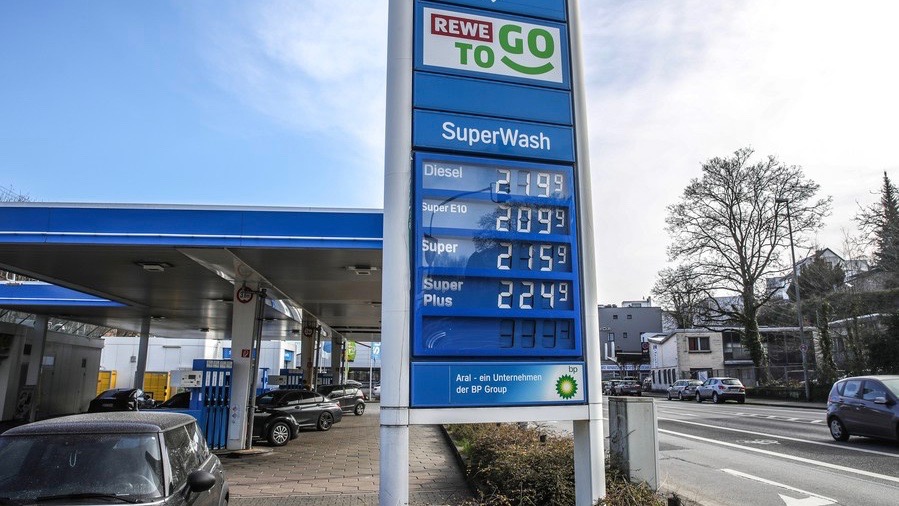The direct impacts of the war in Ukraine, now in its fourth month, are no more limited to Russia and Ukraine. After the growing inflation and food crisis experienced by most of the third world countries, people in Western countries have also started facing the repercussions of the sanctions and pro-war policies adopted by their ruling classes.
On Monday, June 6, US President Joe Biden declared an “energy emergency” in the country, claiming that apart from other things, “disruptions of the energy market” caused by the war in Ukraine is “threatening the ability of the United States to provide sufficient energy generation.”
Though several commentators called the invocation of the energy emergency by Biden an attempt to boost his “green energy” agenda, it is obvious that the rising cost of oil and gas is a major factor. The price of one gallon of gas in the US is close to USD 5 now, the highest since 2008. The supply of Russian oil and gas was disrupted due to sanctions imposed by the US and its allies on Russia following the attack on Ukraine in February.
The price of energy is creating new records in EU countries ever since they decided to follow the US and impose sanctions on Russia. Recently, they decided to also ban all oil imports from Russia. However, the rise in energy prices is not the only repercussion that people in these countries are grappling with.
Food crisis
The international sanctions on Russia imposed by the West and NATO countries following the outbreak of the war in Ukraine have disrupted the export of grains to the world market. This has led to a shortage of food grains in countries dependent on imports and an unprecedented rise in prices.
Russia and Ukraine together supply around one-third of some of the most commonly used food grains, such as wheat, barley and maize, and edible oils like sunflower oil.
Though Western countries and NATO have accused Russia of preventing the export of grains from the Ukrainian port of Odessa, Russia claims that the port is non-operational due to mines laid by the Ukrainians.
The sanctions on Russia and Belarus have also affected the availability and prices of crucial agricultural inputs, oil and fertilizers, as both countries are among the world’s largest suppliers of these commodities. The UN has expressed concern that this may lead to a food crisis in poorer countries.
White House press secretary Karine Jean Pierre on Tuesday cited the war in Ukraine as the main reason for the widespread and historically high inflation in the US, but denied any failure of the policies adopted by the Biden administration.
In Europe, after the UK recorded a steep rise in prices of food, the German Farmers Association warned on Wednesday that food prices will continue to rise. Inflation in Germany hit 7.9% in May, the highest in its post-unification history.
President of the GFA, Joachim Rukwied, claimed that “energy prices have doubled, the prices of fertilizers, especially nitrogen fertilizers has quadrupled on average and fodder costs more.” He also claimed that if fertilizer production does not improve, agriculture yield in the country may see a 30-40% drop in the short term, RT reported.
Sensing the urgency of the matter as well as its own interests, Turkey is trying to initiate talks with Russia to open a safe passage for the export of grains from Ukraine. The move has been supported by the UN.
Turkey has an advantage over its NATO allies as it has refused to impose sanctions on Russia, unlike others. It also tried to play mediator in Russia’s talks with Ukraine in March.
During a press conference in Ankara on Wednesday, Russian foreign minister Sergey Lavrov, who is on a two-day visit to the country, claimed that Russia is ready to provide safe passage to Ukrainian grain. However, he claimed that there is a need to remove mines placed by Ukraine in the Black Sea before the Odessa port can become operational. As per a TASS report, Turkey has agreed to remove the mines.
Still a chance for negotiated settlement
Lavrov, talking to a Russian news channel on Wednesday during his visit to Turkey, claimed that “there is a hope for reaching an agreement” with Ukraine in the future, even if talks are not progressing at the moment.
Lavrov also welcomed mediation from countries “that have given up playing against Russia, understand the causes of the current crisis and Russia’s main national interest, and are not involved in the sanction war.”
Russia had earlier accused the West of disrupting the talks with Ukraine. The last round of talks held in Istanbul in March were stalled allegedly under Western pressure. The West has refused to push negotiations between Ukraine and Russia and instead chosen to prolong the war by supplying weapons to Ukraine.
Earlier this week, UK Prime Minister Boris Johnson was reported saying that Ukraine should not be forced to accept “a bad deal” with Russia. He was earlier reported to be instrumental in breaking the talks between both the countries in March.
Meanwhile, Ukrainian President Volodomyr Zelensky had continued to demand weapons from the West to face Russian aggression. His government has criticized the Germans and the Israelis for refusing to supply weapons.
More countries have joined in the supply of weapons to Ukraine, such as Norway which claimed on Tuesday to have provided 22 howitzers and other ammunition. The US approved four M142 High Mobility Artillery Rocket Systems (HIMRAS) as a part of a USD 700 million military aid package to Ukraine on Tuesday.
Like Johnson, Biden also claimed in an opinion piece in The New York Times that more weapons to Ukraine will help it resist the Russian invasion and make it stronger on the negotiating table.





